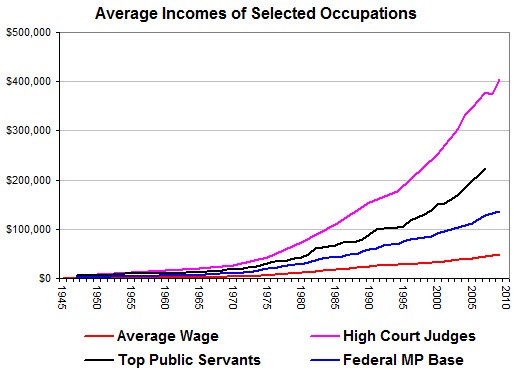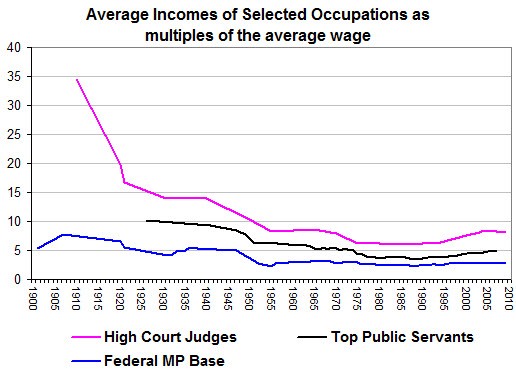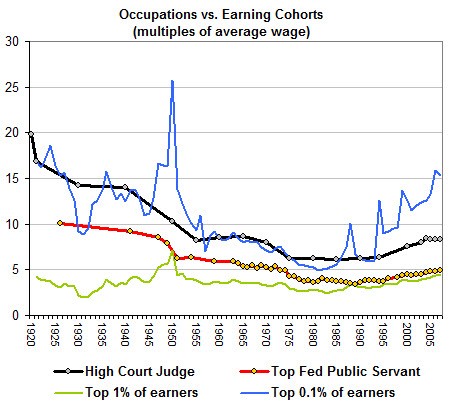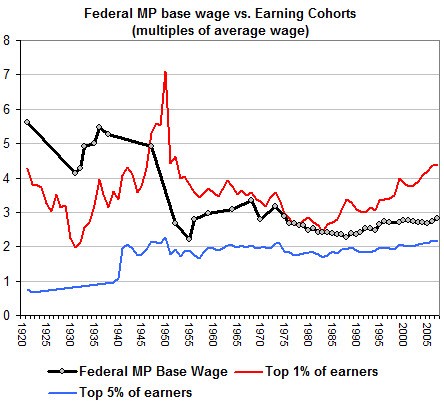Ever wondered what the average income of our top small “p” political occupations earn — such as basic wage federal MPs, High Court judges and top federal public servants? Andrew Leigh and Tony Atkinson in their updated paper The Distribution of Top Incomes in Australia not only tell us this, but also a great many other interesting things.

If you listen carefully, you can hear the tabloids winding up their outrage engines on those overpaid and out-of-touch judges and bureaucrats. However, the picture painted by the raw data is a little deceptive. If we look at how many multiples of the average wage these occupations have earned though history, their relative income patterns tell us an entirely different story.

While top federal public servants are earning relatively the same in multiples of the average wage that they were earning in the early 1970s — about five times the average wage — it is far less compared to the heady days leading up to World War 2, where the nation’s leading bureaucrats were pulling in up to 10 times the average wage.
Similarly for Federal MPs and High Court judges, particularly High Court judges, their relative position on the national income scale has fallen significantly since the pre-war era. Gone for the High Court is the rarefied air of earning nearly 35 times the average wage!
What makes it interesting is tracking these changes against income cohorts. If use the data from the paper to measure how many multiples of the average wage it took to for someone to get into the top 1% and top 0.1% of all income earners, it shows us how these occupations have been tracking compared to their fellow income peers.


While top public servants have been tracking slightly but steadily above the top 1% of income earners since the mid 1980s, our High Court judges have been left behind by their historical top 0.1% peer group.
With our Federal MPs since the early 1980s, their top 1% peers have left them for dead.
If we want to encourage the best people available to undertake some of the most important jobs in the country — our current pay rates are probably acting as a substantial disincentive.
Yet, would we as a country be mature enough to give substantial pay rises to top public servants and High Court judges — people who would nearly all earn far more in the private sector? We’ve probably been leaching off their sense of public duty for years, and any substantial pay rises would become instant tabloid fodder.
If we can’t even get their remuneration on historical par, we have Buckley’s of ever getting it for our federal MPs. For every quality candidate who might decide to pursue politics because of the increased earnings available, there would always be an example of some politician who isn’t worth three dollars an hour, let alone $200,000 a year.
As long as our political parties continue to allow a fair bit of dross to float around our Parliaments, they’ll really only have themselves to blame for public opinion standing strongly against any substantial increase in the base level wages of our representatives.







“For every quality candidate who might decide to pursue politics because of the increased earnings available …”. There’s the problem in a nutshell. For me, anyone who’s going into politics because of the increased earnings is by definition not a quality candidate. I want fewer money-grubbing politicians, not more.
@ Charles. I fear you have missed the point. The sort of losers who go into politics ‘for the money’ are the same losers who would go into it whether the salary is $100,000 or $200,000. The sort of dickhead who goes into it for the money, is the same sort that is unlikely to be on $100,000 in the first place.
No, the real problem is that the current low salary acts as a major disincentive to quality candidates. You are basically relying on quality people to compromise their material living standards for the sake of the community. If you takes this to its logical consclusion, you are left with the wealthy, the mad and the ideologues running the show. No thanks.
I was once told by an old union official that “you should be paid what you’re worth, even if you love the job and would do it for nothing”. So be it for MPs. Pay them what they are worth, which is much more than what they get at the current time.
It seems to me that the problem is that politics is a sub-branch of media celebrity, basically its movies for the ugly or rock music for the talentless. So the rewards that attract people are power, fame and a sense of personal relevance and fabulousness. I would happily pay them more if the government was less about being best-in-show and more of a competent managerial organisation. Then you would have to pay politicians more or you would not attract candidates from actual decision making roles in corporations.
@Peter.
I think it’s sickening that you think quality people = salary. Lots of “quality people” don’t chase the filthy lucre and lots of rich people are mediocre in the extreme.
If you think the salary of politicians is low you’re not living in the real world. And I don’t want to be represented by somebody who thinks that that sort of elite salary is low.
As it is, most politicians have got their mitts in lots of other honeypots, so they don’t have a shortage of income from other sources if a few multiples of the average income + countless allowances isn’t enough for the poor dears.
@Altakoi
Attracting candidates from actual decision making roles in corporations? They already make half the decisions in this country without having to run for office – more money would not induce them to suffer the inconvenience of public scrutiny when it’s done so easily from their golden towers.
I personally want LESS not more corporate influence of political and public life.